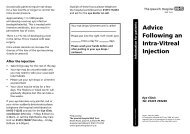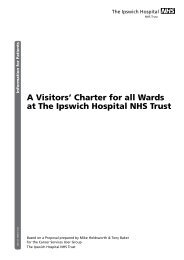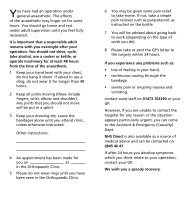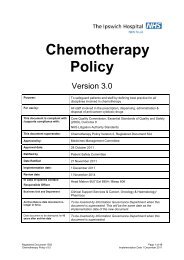Discharge Information for Patients with Asthma - Ipswich Hospital
Discharge Information for Patients with Asthma - Ipswich Hospital
Discharge Information for Patients with Asthma - Ipswich Hospital
You also want an ePaper? Increase the reach of your titles
YUMPU automatically turns print PDFs into web optimized ePapers that Google loves.
General Advice Regarding Your<br />
<strong>Asthma</strong><br />
Has your asthma been keeping you awake<br />
at night or playing up during the day<br />
If your answer is ‘Yes’, make an<br />
appointment to see your doctor or practice<br />
nurse as soon as possible.<br />
Are you using a preventer (steroid inhaler)<br />
regularly<br />
If your answer is ‘No’, or you didn’t know<br />
that a preventer can reduce attacks and<br />
control asthma, make an appointment to<br />
see your doctor or practice nurse to find<br />
out.<br />
Have you got a peak flow meter and an<br />
asthma management plan<br />
If your answer is ‘No’, make an<br />
appointment to see your doctor or practice<br />
nurse.<br />
Further <strong>In<strong>for</strong>mation</strong><br />
<strong>Asthma</strong> UK<br />
www.asthma.org.uk<br />
British Lung Foundation<br />
www.lunguk.org<br />
<strong>In<strong>for</strong>mation</strong> <strong>for</strong> patients<br />
SAMPLE<br />
<strong>Discharge</strong><br />
<strong>In<strong>for</strong>mation</strong><br />
<strong>for</strong> <strong>Patients</strong><br />
<strong>with</strong> <strong>Asthma</strong><br />
Name:<br />
Outreach Respiratory Team<br />
Tel: 01473 703482<br />
Produced by:<br />
The <strong>Ipswich</strong> <strong>Hospital</strong> NHS Trust<br />
Heath Road, <strong>Ipswich</strong>, Suffolk IP4 5PD<br />
<strong>Hospital</strong> switchboard: 01473 712233<br />
www.ipswichhospital.nhs.uk<br />
DMI ref: 0249-08.indd(RP)<br />
Issue 1: March 2008<br />
© The <strong>Ipswich</strong> <strong>Hospital</strong> NHS Trust, 2008. All rights<br />
reserved. Not to be reproduced in whole, or in part,<br />
<strong>with</strong>out the permission of the copyright owner.
An asthma attack has caused you to come<br />
to hospital.<br />
This in<strong>for</strong>mation leaflet aims to help you<br />
get over this attack and also gives guidance<br />
on how to prevent further attacks.<br />
<strong>Discharge</strong> Medication<br />
Steroids<br />
In order to control your asthma you<br />
have been given some steroid tablets<br />
(prednisolone). It is important to take the<br />
whole course, as directed, to prevent the<br />
asthma attack returning. Take the tablets<br />
in the mornings at the following times:<br />
If your tablets are RED:<br />
½ hour be<strong>for</strong>e breakfast<br />
If your tablets are WHITE:<br />
After breakfast<br />
Inhalers<br />
Your preventer inhaler controls your<br />
asthma and stops further attacks.<br />
It is called:<br />
Use this as directed and do not stop using<br />
it, even when you are feeling better. It<br />
is important to continue to use it when<br />
taking oral steroids.<br />
Your reliever inhaler should be used when<br />
you become wheezy.<br />
It is called:<br />
Peak Flow Monitoring<br />
Peak flow monitoring tests whether your<br />
asthma is getting worse and is useful to<br />
show your recovery from an attack. If you<br />
do not have your own peak flow meter<br />
please ask the nursing staff <strong>for</strong> one. During<br />
periods when your asthma is unstable we<br />
advise you to monitor your peak flow three<br />
times a day (morning, noon and night).<br />
The meter comes <strong>with</strong> a chart on which to<br />
record the readings.<br />
We compare your peak flow <strong>with</strong> your best<br />
reading achieved in the last year or the<br />
predicted level if you are unsure of your<br />
best.<br />
Best / Predicted PEF:<br />
<strong>Asthma</strong> Management Plans<br />
It is important to know what to do when<br />
your asthma worsens. We advise you to<br />
speak to your practice nurse to discuss<br />
what action you can take if your asthma<br />
gets worse and to agree an asthma<br />
management plan. This should help<br />
prevent attacks getting so severe that you<br />
need to come to hospital.<br />
SAMPLE<br />
Follow-up After This Attack<br />
It is important <strong>for</strong> you to make an<br />
appointment to see your GP or practice<br />
nurse <strong>with</strong>in two working days of your<br />
discharge from hospital. This is to make<br />
sure that you continue to improve<br />
following discharge and to decide if you<br />
need a longer course of treatment to settle<br />
the attack.<br />
Ô
















